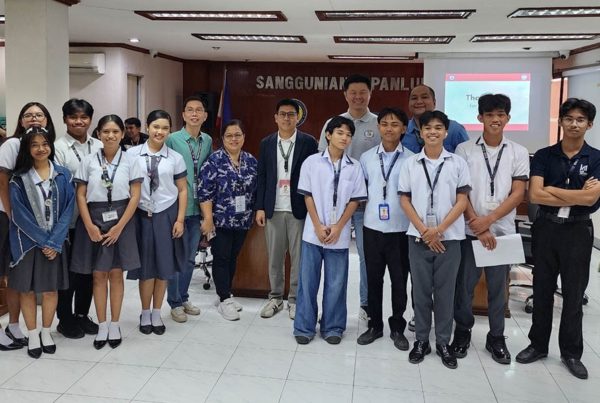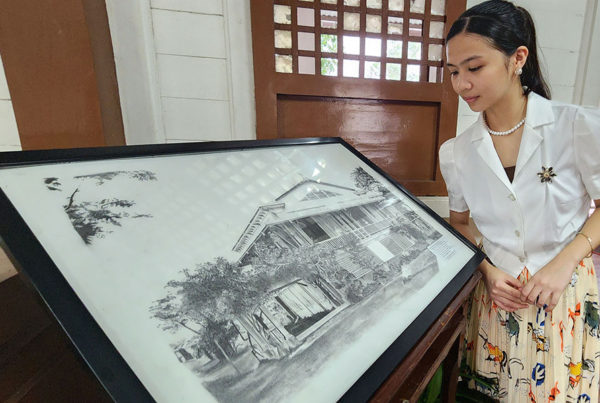
DCNHS and KB Chorale: Keeping the music playing
 By Rex Catubig
By Rex Catubig
IT was the ’70s. The world was on the cusp. The world they were born in was fast transitioning into the world they were growing up in.
They were born at the tail end of the Platters as the world began gyrating and twisting with Elvis and Chubby Checker, screaming to Hard Day’s Night of Beatles, then strutting to the Saturday Night Fever falsetto disco of the BeeGees.
Meantime, the Vietnam war was escalating, hippies ruled the planet and Flower people were imploring to Make Love not War as they drifted in psychedelic consciousness and showed how peace is possible in Woodstock.
The Philippines was no stranger to worldwide turmoil. Civil unrest was becoming more rampant. It would be just a matter of time when Martial Law would befall a nation.
Against this backdrop, life went on unimpeded for these high school students who were caught in their cusp of adolescence and adulthood.

The emboldened ones were drawn to civil dissent. While the rest found other ways to express themselves to find meaning in the confusing environment.
To a motley assortment of Dagupan City High School students, music and choral singing was the panacea to raging pubescent hormones in troubled times. And by a stroke of fate, a Pied Piper turned up in the person of a music teacher, Pepito Magbutay, who entranced this flock of musical neophytes.
Rehearsals were held after classes. Equipped only with their nascent passion for music, they would stay for an hour or two, to exercise their vocal chords. And never mind if borborygmi was acting up in their tummies. Singing filled their being, and carried them through their hunger pangs.
And they would walk home, sprightly and inspired, with nimble notes dancing in their heads.
Score sheets would pile up in their lives as they transformed from a school-based chorale to one affiliated with a youth organization. They would be known as the KB Chorale, acronym for Kabataang Barangay, under whose banner they were the team to beat in regional and national competitions.
But not everything was a hit tune. A discordant experience happened when they were a finalist in a national competition at the Cultural Center of the Philippines–the bastion of the country’s arts and culture, but otherwise perceived as a symbol of a profligate dictatorship.
It was a dream-come-true event and they went the whole nine yards to prepare. The members aggressively solicited personal sponsors for their competition garments. And they sought the services of a well- known local couturier to execute what they hoped was their winning attire.
They chose bright yellow and black for their color ensemble, imagining how elegant they would look onstage. But they did not foreshadow the momentous incident that happened next.
Just a couple of weeks before the contest, the nation was shocked by the assassination of Sen Ninoy Aquino as he arrived from exile. In the outpouring of sympathy and outrage, the color yellow and black became emblematic of the nation’s grief and protest.
They would surely be branded as opposition. But it was too late to make changes. They opted to take the risk: The show must go on.
Imagine their apprehension as they were called on stage. The cavernous hall was silent as they walked to their formation. Then waves of murmurs and gasps swept the audience.
To further aggravate the situation, their contest piece was the elegiac Hindi Kita Malilimutan—which had turned into a political battle cry. It was the nail that sealed their fate. As expected, their dream for the top prize was instantly entombed.

As the group gathered to celebrate their first general reunion January 4th, as organized by its first president, avid music advocate, Jong Otanes, the hall echoed varied anecdotes and diverse recollections.
But all agreed that having joined the chorale transformed their lives, maybe not in some phenomenally symphonic way, but in some simple melodic coda. They joined because they loved to sing. But no one reckoned that the lilting notes of a song should reverberate through the years long after they have sung the last note.

In that night of nights, it was clear that above the din of effusive thank-you’s, each still carries a resonant note in his heart, a harmonic reassurance that they will keep the music playing—even when they would already be out of tune.










